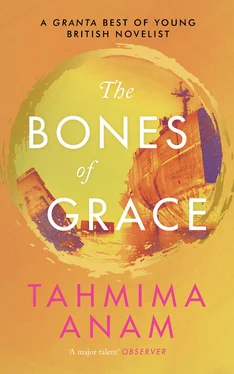‘Yes,’ she said, emerging from behind her camera.
‘Why did you come here?’ Mo said.
‘Because we want to know about your lives,’ Gabriela said.
This seemed to satisfy him. Here, in this room, Mo was in charge, putting himself beside me, gesturing with his hands for the others to talk or be quiet. ‘All right. You can start now.’
By the third week, I had memorised everyone’s names, and they had started calling me ‘Apa’ instead of ‘madam’. We met in one of the bigger rooms in the dormitory, the boys crowding onto the bunks, me sitting among them with the microphone, Gabriela behind the camera. The sessions began in the evening, after the shift had ended, and went on for several hours into the night. Mo kept a close watch on me, sitting beside me and directing the conversation, saying, this one has something important to tell you, or ask that one about his village, where the water is full of arsenic, yes, you cunt, she wants to know about the arsenic too. The whole story is what she needs. We hadn’t said this to him specifically, but somehow he knew that we were there to get under the surface, to hear all the little details that made up the people that made up the shipyard. He hadn’t needed a class in ethnographic field methods to know this, he just knew, because Mo was like that, a kind of effervescent psychic, reading our minds and telling other people what we wanted them to know.
One night we started late. The cutting crew had taken a huge piece of metal off the oil tanker that sat next to Grace . The pullers had tried to fix their ropes to get this piece of the tanker up the beach, and as the light had faded they had just about given up, but Ali had pushed them to try again, and they had spent several hours trying to manoeuvre it without success. The cutters would have to break it into smaller pieces the next day, and they would try again.
When I arrived, the boys were tired, their bodies slumped forward as they balanced on their heels in front of me. Mo had come up with the idea that each of them would tell me the story of where he had come from, about his village, his family, the people he had left behind. Last week, there was a boy, Russel, who said his brother had come to the beach to work as a puller the year before. He had sent money, just as he’d promised, but eight months later the money stopped coming. They tried to contact a relation, the cousin who had set him up with the job, but no one could find either of them. So they sent their second son to find his brother, but when Russel landed in Sithakunda he realised how futile the search would be, the locked gates in front of each of the shipyards, the miles and miles of lots. They hadn’t even known the name of the company, or the foreman in charge. So Russel just stayed, lucky to have been recruited as a puller for Prosperity, which was one of the better employers. He hadn’t been home in two years, just sent the money to his parents, as his brother had done before him.
Now it was the turn of one of the older ones. He cleared his throat and shifted the weight on his feet. With slow deliberation, he pointed his mouth at the tape recorder, anticipating the nods and the shakes of the head that would accompany his speech, the men who knew what it was to be him, the ones who had suffered like him, seen the things he had seen, tasted the bitter things he had tasted. ‘It was the Monga, seven years ago,’ he began, referring to the famine that grips the north of the country between harvests. ‘We thought we had enough rice. It was my mother and my father, my wife, three children, another coming.’ I knew what he was about to say, and so did the others, but we all trained our eyes on him and listened. It was two months before the harvest that the rice ran out. He went to sell his labour, but there was no work going. His father walked into the fields one day and didn’t come back. But still there wasn’t enough. He had a daughter, three years old, and she was the first to go. Then winter set in, and, with it, a fever that spread through the village. The man wiped his face again and again with his right hand, telling the story with his left hand. As he came to the death of his wife, he put his head down between his knees, shaking his arms back and forth, as if he could wipe the story from his memory. Now he works to feed the two remaining children, left up north with his brother.
‘Say your name into the tape recorder,’ Mo said.
‘Belal,’ he said.
I asked the men to tell me what had happened that day, and they said that the cutters would sometimes take enormous chunks from the ships, pieces they knew the pullers wouldn’t be able to haul up the beach. ‘They do it to torture us,’ one of them said. The pullers would waste time trying this or that to get the piece to move, knowing all the time that it wouldn’t work. Then they would be forced to wait while the cutters split the large pieces into smaller ones. The managers knew what was going on, but they didn’t interfere. There was an order on the lot, a hierarchy that had to be maintained and obeyed, and the pullers from the north were at the very bottom.
I passed around a flask of tea. They sipped in silence, gazing into the kerosene lamp. Gabriela and I took our leave, promising to return the following week. We stepped out into the darkness with Mo. The moon was weak but we could still see the outline of Grace . Small fires illuminated the darkness as the night shift worked on the remaining sheets from the oil tanker. We passed through Prosperity’s gates.
Mo had to return to the beach to finish something for Ali. ‘We’ll be all right,’ I told him, ‘it’s not far.’ He said he would walk with us but I insisted and Gabriela told him to go on, that we would see him the next afternoon when he came to cook dinner. The stories went around and around in my mind. As I was listening to Belal I had made every attempt to remain impassive, but, now that I was no longer in his presence, the depth of his loss slowly sank in. It was quiet and I could hear the sound of the water hitting the shore. Gabriela and I walked in silence until we were home. I almost ran the last few steps because I felt a strange sensation, like someone was following me. At the apartment Gabriela wanted to talk about the meeting, but I was rendered mute by the memory of Belal’s face, his thin, sad lips mouthing the story of his daughter’s death. Gabriela suggested we go out. There was nowhere really for us to go at that late hour, so I called Komola and asked if I could come over with a friend, and of course she said yes and asked what we wanted to eat.
Gabriela borrowed the Shipsafe car and we drove into the city with the windows rolled down, and immediately I felt better. I was embarrassed when we entered the house; Gabriela looked everything up and down and I could tell I was being cast in a new light, but Komola brought us a tray with ice cream and tinned fruit, and the heaviness that had lodged in me started to dissipate.
‘There must be something we can do for them,’ Gabriela said, putting a spoonful of cubed fruit into her mouth. ‘How can you stand it?’
‘We’re doing something. You’re making this film.’
Her spoon clattered against the side of the bowl. ‘A film seems like a pathetic response. Is there any more of this?’ she asked, gesturing to her empty dish.
‘I’ll ask Komola.’
Downstairs, Komola said there wasn’t any more fruit, but that there was some leftover rice pudding in the fridge. She had been chewing betel, and her mouth was lined with red. She reminded me of Nanu, not that Nanu chewed betel — she didn’t — but in the way that she regarded me, with a love that she expected to flow in only one direction.
In the morning Komola made us omelettes and we sat in the garden with our tea cups. I was thankful to Gabriela for not asking me to explain about the house or my marriage. Neither of us wanted to go back to Prosperity, so we had Joshim take us on a long walk around the estate. After lunch, Gabriela sketched out a few ideas for the film while I read over my notes from the night before. Finally, reluctantly, we prepared to return to Sithakunda.
Читать дальше












